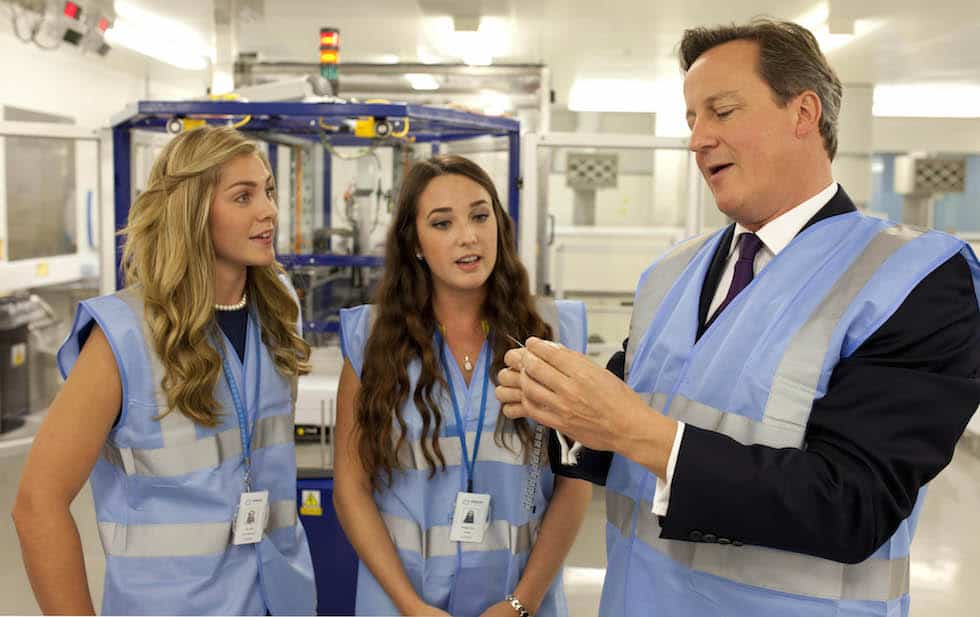
Pat Cole (pictured left) is the Site Director for Abbott’s diabetes care business in Witney, Oxfordshire where almost 700 people are working across a broad spectrum of roles including PhD scientists, clinical and regulatory experts, and manufacturing specialists.
Student Engineer got in touch with Pat, who has been at Abbott for 15 years, to talk about the company and its current recruitment campaign.
In order to provide some context, can you tell Student Engineer a little about Abbott?
At Abbott, we’re committed to helping you live your best possible life through the power of health. For more than 125 years, we’ve brought new products and technologies to the world -- in nutrition, diagnostics, medical devices and branded generic pharmaceuticals -- that create more possibilities for more people at all stages of life. Today, 73,000 of us are working to help people live not just longer, but better, in the more than 150 countries we serve. Our diabetes care business is part of the medical devices division.
Where do engineering graduates fit into Abbott’s current recruitment drive?
Engineering plays an important role throughout Abbott and we pride ourselves on having some of the very best engineers working in this organisation. At Witney we have a history of engineering excellence ranging from R&D concept and design, cutting edge technology with control systems and automation through to maintenance support. In 2014, we launched a new product called Freestyle Libre, which is an on-body sensor that measures glucose for people with diabetes. We recognised that this was a great platform on which to launch a graduate programme initially recruiting both science and engineering graduates into a 3-year programme. For the last 2 graduate intakes we have narrowed our offering to engineering graduates, as this is the area that we want to focus our development activities on.
In general, what kind of engineering roles does Abbott offer graduates in the UK?
We are looking to develop our graduate engineers in a number of specialisms – systems, PLC, project and production management as well as becoming subject matter experts in the cutting edge equipment. In our diabetes care business here they are at the forefront of developing this world first technology that can make a real difference to people’s lives. Our graduate engineers work across all aspects of that.
How is Abbott’s Graduate Recruitment Programme structured?
The programme is designed to give our graduates breadth of experience during the three years so we initially concentrate on giving them ground-up working knowledge of the product and process and then move them into a rotation process whereby they may have a planning role or working in our quality function and then perhaps into technical or even a leadership role. At the end of their three years we hope to have not only developed their engineering skills but also developed them in understanding the wider business and how they fit into that.

Can you tell Student Engineer how the application process for the grad scheme works?
Our University Relations and our Talent Acquisition teams attend various career fairs at universities and promote our graduate scheme. When we start to actively recruit for the annual intake we will advertise via various methods around October/November time for a July start date. Once CV’s start to arrive our team will start to filter those and commence first line of selection for a graduate assessment day.
Some companies run assessment centres and some assess candidates through the interview process. In this respect, what does Abbott do and how should candidates prepare for them?
We have a tried and tested assessment process, which also includes a formal interview session. Through the assessment structure we test technical ability; conduct an interview and have exercises that show how the candidates would perform in a team environment. Throughout the day applicants interface with a wide variety of people here who mark candidates using a balanced scorecard approach. This also allows potential employees to take a good look at us too and assess if they’d like to be part of our team.
What makes a good engineering recruit for Abbott? What are the particular skills or qualities or values that suit the company?
Naturally we want a sound educational background and good solid qualifications but we are also looking for signs of potential that we can work with and ultimately maximise. The assessment day is structured to tease out lots of different attributes and enable people’s strengths and weaknesses to be judged in a balanced way. We always have team fit in our minds when observing these candidates.
How important are internships or placements when you’re evaluating CVs?
They are not essential as experiences can be gained in many different ways but we typically see that where the candidates have had the opportunity to experience the world of work, even for a short period, they have a greater ability to understand the context of what they might be asked to do.
What final word of advice would you offer potential graduate recruits?
Pay attention to your CV – our work relies on attention to detail and if you can’t demonstrate that with your CV then it does raise questions. Do your research – these days there is no excuse for not understanding something of the company you are applying for work. Be confident but not arrogant and always be true to yourself. Try to remember that most prospective employers want their candidates to be successful so try and leave some of your nerves at the door.
Thanks Pat!




Poll: Should the UK’s railways be renationalised?
I think that a network inclusive of the vehicles on it would make sense. However it remains to be seen if there is any plan for it to be for the...